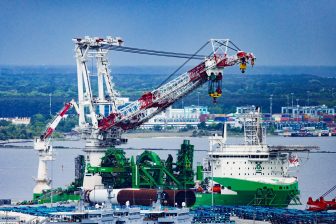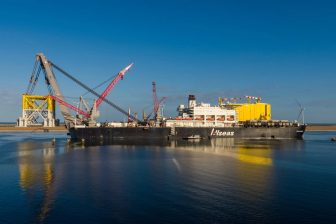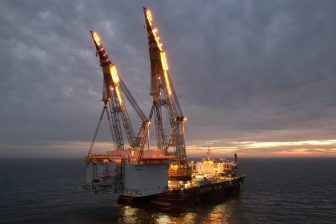
Maersk Supply Service awarded North Sea decommissioning contract
Maersk Supply Service has been awarded a contract by Fairfield Betula Limited for the removal of the Dunlin Alpha platform’s subsea conductors and guide frames.
Maersk Supply Service will remove four 30 feet jacket-mounted drilling conductors and two associated conductor guide frames using one of its DP3 I-class vessels, which are equipped with a 400-tonne main crane, a 100-tonne auxiliary crane, a moonpool and work-class remote operated vehicles (WROV).
“This is a technically challenging scope with large periods of time spent alongside a platform. It is gratifying to see our engineered technical solution selected by Fairfield, as the removal of older conductors that cannot be pulled through topsides remains a challenge throughout the North Sea”, says Olivier Trouvé, Head of Integrated Solutions.
Project management and engineering commence this year with offshore execution planned for 2022 or 2023.
Decommissioning growth
Rystad Energy expects that the current oil crisis will spur offshore decommissioning as oil companies have little profitable investment opportunities left. So instead, operators will increase their spending on decommissioning and leverage the low price environment to fulfil obligations at costs, the analysts state.
Most projects will take place in the North Sea, where assets have an average age of 25 years and the low oil price has negatively impacted the commercial viability of potential life extensions.
The Northwest European decommissioning market could grow 20% in annual commitments through 2022 if the current low oil prices don’t show signs of substantial recovery soon. So far, only 15% of North Sea assets have been decommissioned, but Rystad Energy expects an average of 23 assets to cease production annually in the coming five years, creating a 17 billion dollar market.
Maersk Decom
Maersk also expects the North Sea decommissioning market to pick up. In 2018, the company launched a new 50:50 joint venture between Maersk Drilling and Maersk Supply Service called Maersk Decom to provide decommissioning services to oil and gas operators.
“After decades of production, an increasing amount of offshore oil and gas fields are approaching the end of their economic life. In the North Sea alone, more than 400 fields are expected to cease production by 2026 at an estimated cost of USD 56 billion. Globally, over 700 fields are expected to require decommissioning”, the company stated when it commenced operations.
Maersk Decom and Maersk Supply Service have executed jobs together but this particular contract is carried out by Maersk Supply Service alone.
Layoffs
The contract is a welcome opportunity for the Danish offshore services provider which is struggling with the new downturn in the oil and gas market. In March, the company announced that it will reduce its onshore costs by 30%, meaning some 55 people will be laid off.
“We realise that the announcement is very unsettling, and indeed undeserved, for our employees. However, as we expect a significantly reduced activity level in the oil and gas industry, it is a necessary step to ensure our organisation reflects the current market reality and to safeguard the future of our company,” said CEO of Maersk Supply Service, Steen Karstensen.
The changes are expected to concern all onshore functions of Maersk Supply Service and take effect within May.
You just read one of our premium articles free of charge
Register now to keep reading premium articles.



